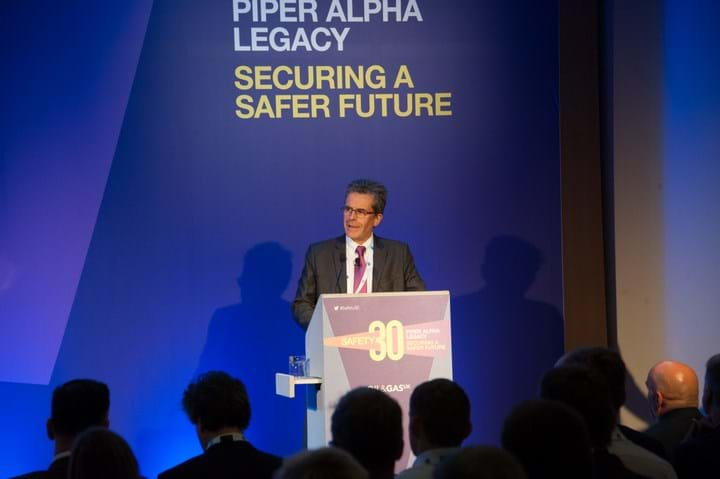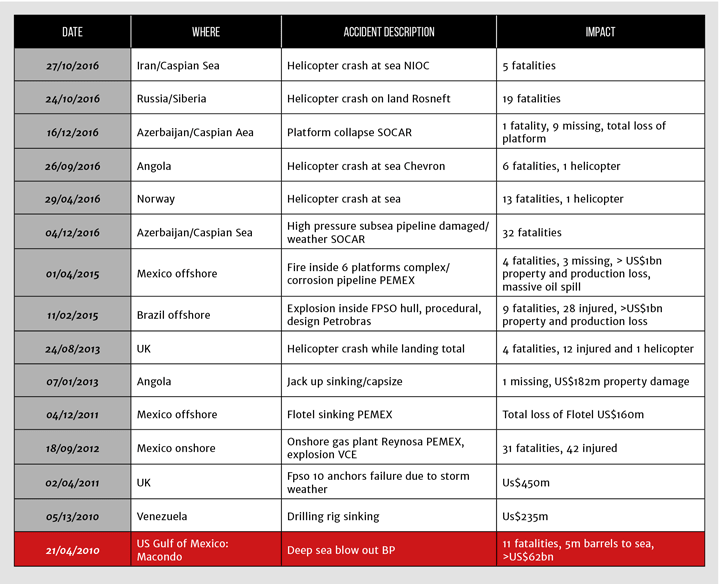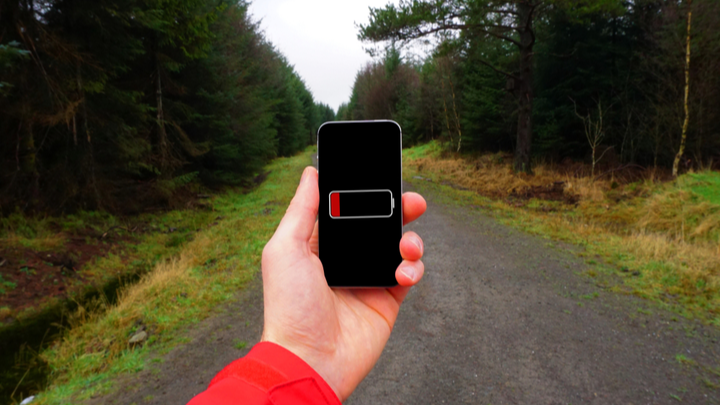Terry Cooper: Preventer of Major Accidents

WITH nearly 40 years in our industry I would like to share with you some of my experience and a few ideas on the “art of keeping hydrocarbons where they need to be – contained!”
As I began to reflect on this speech I thought “hang on a minute” how many here were even born 30 years ago to have gone through the emotional shock of the Piper Alpha disaster.
30 years is a long time – it’s nearly a working lifetime. 90% of Total’s workforce were not in the industry when Piper Alpha occurred. Only 10% the veterans are left to tell the tale of what it was like to live through.
The memory of 6 July 1988 is etched in my memory – I was transfixed in front of a TV in the living quarters of the Alwyn North platform.
What to discuss?
I took the opportunity to ask the event organiser, colleagues, friends, the boss, and my family what they thought I should speak about.
The organiser suggested that I should “challenge you all on whether or not complacency in the UK is settling in”. Challenging. That’s right up my street: getting people to think out of the box. To quote Einstein: “We cannot solve our problems with the same thinking we used when we created them.”
The suggestion from my colleagues and peers: “The industry has got to step up its game on process safety management.
The boss said: “You’re not going there to give a lecture. Keep it personal, share your experience. Focus on the prevention of major accidents. Challenge the perception that major accidents are rare events.”
So let’s begin with major accidents. Are they as rare as you think they are?
Do not kid yourselves that major accidents can’t happen to you. Statements such as “it’s never happened in my lifetime” must be challenged.
If I were to ask you all “what is the last major accident that you remember?” I would hear perhaps Macondo, Texas City, Buncefield.
In six years, there have been at least 14 major accidents since Macondo, with 137 fatalities.

As you can see, major risk is not only about fire and explosion. Since Macondo there have been five helicopter crashes, killing 47 people. There have been five anchor failures, platform collapses or sinkings that have killed 11 people and cost at least US$2bn. And there have been four fires or explosions that have killed 79 people and cost at least US$2bn.
World class safety – the gold standard
I believe that I have heard expressions such as “the UK is a world-class safety leader”. I have heard similar from the Norwegian sector as well.
However, ask yourselves: “Have we gone far enough?” Are we willing to live with fatalities caused by loss of containment?
What is the rest of the world doing? Are you aware that in some other parts of the world they have surpassed the UK sector? We must focus on process safety to eliminate fatalities whilst maintaining our efforts on occupational safety.
Process safety
In 2006 The International Oil & Gas Producers Association companies reported 115 fatalities. In 2016 there were 50. Ten years to halve that number.
One of the main contributors were explosions and pressure releases – process safety events.
In the last ten years, 128 people have failed to return home to their loved ones due to 56 process safety events. Approximately a 50/50 split between ‘ignited’ versus ‘struck-by’ events.
In the last ten years, 128 people have failed to return home to their loved ones due to 56 process safety events.
Ignited events account for 75% of the fatalities. Nearly all 4+ fatality events involve ignition.
Ignited events killed 96 people: 48% during maintenance, inspection and testing; 31% during drilling, workover and well services; and 17% during normal production operations.
Meanwhile, struck-by events killed 28 people: 44% during maintenance, inspection and testing; 33% during drilling, workover and well services; and 19% during normal production operations.
On average we see a 4+ fatality disaster every 18 months!
So what can we do? Along with the life-saving rules, we must put in place across the industry common process safety fundamental rules. Rules such as:
- always use two barriers;
- do not leave an open drain or critical operation unattended; and
- always check that equipment is pressure free and drained and provides safe isolation before starting maintenance work.
Sharing lessons learnt
As you will recall one of the recommendations from Piper Alpha is the need to share lessons learnt. What about all those high potential incidents that we are all experiencing? Do you think that we are good at sharing lessons learnt across industry? Major accidents are rare events on an individual company basis. Not so rare across the industry. So, companies must be able to share lessons learnt for the benefit of all.
One challenge that we face is overcoming the legal firewall hurdles that limit sharing lessons.
I would like to share with you one of major losses of containment that I have been involved in, which released far greater volumes of gas/condensate than the initiating event of Piper Alpha, and no, I am not going to talk about the Elgin/Franklin gas leak in 2012.
In 1988, I was based offshore in the UK sector of the North Sea. During a platform turnaround (summer shutdown campaign), a few days after Piper Alpha, a technician opened a 20” gas export riser isolation valve, which was part of a double block and bleed isolation, to carry out maintenance.
The pipeline, which was thought to be in a depressurised condition, was in fact at 120 bar. The resulting gas cloud completely enveloped the whole platform. It was as if a North Sea haar had come in. I could see gas being sucked into the power gen turbine air intakes. It is a very sobering moment when one’s friends and colleagues disappear into a gas cloud with breathing apparatus equipment on – to close the offending valve. Would they ever return?
Fortunately, nothing untoward happened as our emergency systems worked.
Family
I believe we all share the value “family”. You’d probably do anything you could to keep your family safe and I’m sure they feel the same way about you. But at work, it’s not about what they do, it’s about what we do each and every day.
My wife and I have three children. No longer children as they are 26, 25 and 22. During their formative years our main focus was for each of them to get the best education that we could afford.
My son Conan is 26. When he announced that he wanted to be a chemical engineer and work in the oil industry – my wife was shocked and I was apprehensive. We never revealed our feelings as he has to make his own way in life. If this were happening 30 years ago our reaction might have been “Son, anything but oil.”
This is how I remember the conversation went:
“Why?”we asked.
“Well, Dad, I have followed you around the world and that is what I want to do – travel.”
“Ok. Why oil – it is a declining industry? It’s not safe!?”
“Dad, come on. First, it’s the energy industry I want to join – not just oil. Second, oil is a lot safer than it used to be. I have witnessed on the sidelines the efforts that you, your colleagues and the industry have been making to improve safety.”
“Well, ok tell me about Piper Alpha.”
“What do you want to know? I’ve seen the video five times even before graduating.”
Can we say that this is the case for all universities, about sharing the lessons of major accidents?
He joined the industry four years ago in Aberdeen. Whilst I am speaking to you at this very moment he is arriving in Congo, to work on rotation for three years on an FPSO. An FPSO which has been designed taking into account lessons learnt from Piper Alpha and other major accidents.
My daughter Caitlin is 22. The second time I went into safety, the conversation went like this:
“Oh not again Dad!”
“What do you mean?”
“Well you always bring the safety initiatives home to practise on us?”
“Such as?”
“Remember the safe subconscious behaviours programme ‘Positive Solutions’ that you ran when I was 7?”
“Sure do. It did wonders for your swimming, and you are always picking us up on our unsafe behaviours.”
I admit I do find it challenging to think and act safety 24/7. No problem for my daughter: it is in her DNA. Is it in your company’s DNA? How do you know?
Cessation of production
Cast a critical eye over your cessation plans. Are you pushing your ageing assets too hard and for too long? Ask the question: “How far can one go beyond the ‘best before date’ before calling it a day?”
If you will permit me I would like to share a personal obsolescence plan.
A year ago at the age of 61 I ran my first marathon in Edinburgh. Very much against the wishes of my wife who thought that I was mad. My kids were very supportive though.
Anyway, I finished safely although I didn’t quite reach my goal of running 26.2 miles in less than four hours. So, I was all fired up and immediately entered for the 2018 Edinburgh Marathon – to have a one year preparation. I wanted to go faster.
To satisfy myself and my wife that my ageing asset was up for the task I went for a series of medical checks, radiographs and MRI scan in order to have a “fit-for-purpose” green light.

So what happened?
The doctor:
“Monsieur Cooper – the aches and pains that you are experiencing are to be expected at votre age – your body, your asset, is not same as it was 30 years ago. I know that it will be futile to advise you stop running as I know you will ignore the advice – so I won’t.”
My wife was more direct: “If you carry on running I am not prepared to push you around in a wheelchair when you are 95!”
How could I ignore the expert advice? I know I needed to do a risk assessment:
- Risk 1: Risk of injury and perhaps even death.
- Risk 2: Lack of communication during the race with loved ones for 4–5 hours. This wouldn’t be very clever as my wife was so focussed on Risk 1.
Mitigating actions (barriers):
- Rocktape: The runners amongst you will know about Rocktape. “Go stronger, longer” is its slogan. Delays fatigue, reduces risk of injury and enhances performance.
- Use an iPhone with Find my Friends tracking. Ideal. At any one time they will know where I am and if needed they would be able to contact me.
The race
I had full confidence in the mitigation barriers I had put in place.
I ran a slower marathon without injury, mainly because after 15 miles my legs took command – protesting that they couldn’t go any faster or longer at the pace that I was forcing – so I slowed down.
Well I am here to tell the tale so perhaps the Rocktape helped.
As for the Steve Jobs invention. At the finish line I could see the stress physically in the faces of my wife and daughter, along with tears of ‘joy’.

However, I was met with a cry of: “Where the blazes have you been? We have been worried sick. Your location got stuck 5 miles from the finish. We thought that you had collapsed. We have been trying to contact you and anyone else for information.”
“My dear – the only thing that died was my iPhone battery!”
Does that sound familiar? How many wraps and clamps does your installation have to keep it going? Like my iPhone, ask yourself if the barriers on your installation could let you down unexpectedly when needed?
Conclusion
Major accidents are not as rare as you think they are. Be vigilant on looking out for the weak signals and signs of danger.
World class safety. I don’t believe that the UK oil industry has become complacent, however, there has to be a step change on process safety and integrity to eliminate fatalities.
While I don’t claim to have all or even some of the answers to the questions raised here, I do have some ideas.
Process safety events are one of the biggest causes of fatalities. The industry must develop common process safety fundamentals – rules – alongside the life-saving rules. 85% of losses of containment in Total could have been avoided if we had in place the 10 Process Safety Fundamentals seen elsewhere in the industry.
Lessons learnt: take down the barriers which hamper the sharing of lessons.
For ageing installations going well beyond their “best before date”, critically assess their physical integrity status and the competence of your workforce, both young and old, before endorsing an extended production cessation date.
Finally, safety as a core value. Ask: what does that actually mean to you? I challenge you all to ask your chief executive, your executive management team and your supervisors as to what “safety as core value” means to them and to the workforce.
To become a core value there must be engagement and commitment throughout the organisation chain of command. This must run from the chief executive through the “middle clay management layers” to the workforce. Process safety, as well as occupational safety must have a seat at the table. Everyone, if you are not already doing so, focus on Process Safety. This includes apprentices and graduates of all disciplines technical and non-technical. Be aware of the lessons of the past and focus your talents on solving the challenges of the future.
I remind you of the Einstein quotation I used earlier: “We cannot solve our problems with the same thinking we used when we created them.” Challenge the status quo and think differently about process safety.
Finally, one last Einstein quotation:
“Concern for man and his fate must always form the chief interest of all technical endeavours. Never forget this in the midst of your diagrams and equations.”
We have added fresh perspectives each day in the run up to the 30th anniversary of the Piper Alpha tragedy. Read the rest of the series here.
Recent Editions
Catch up on the latest news, views and jobs from The Chemical Engineer. Below are the four latest issues. View a wider selection of the archive from within the Magazine section of this site.




